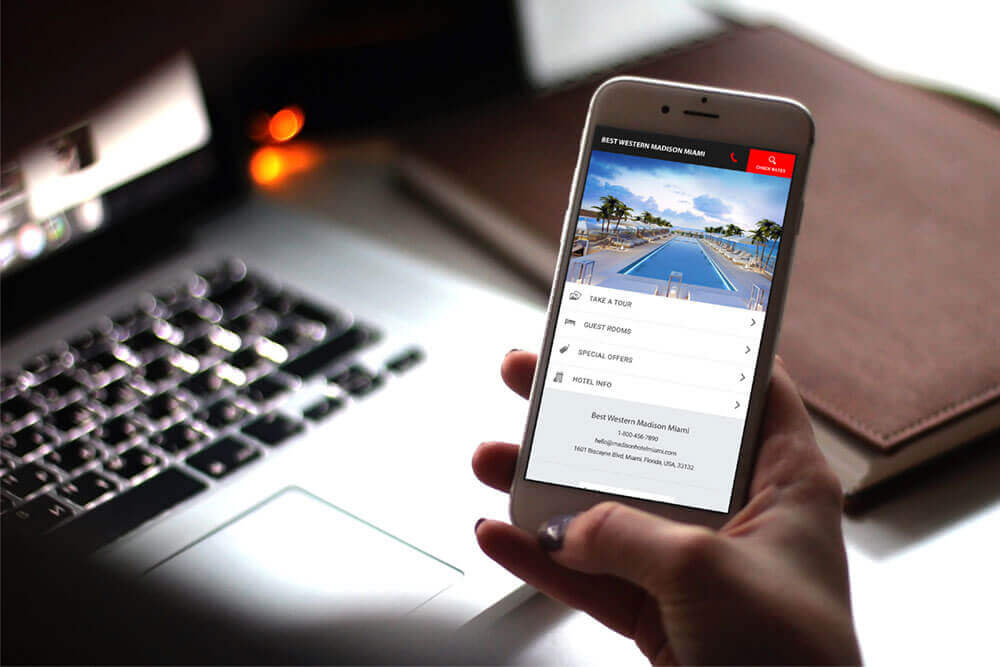
Travel and hospitality brands are shifting their marketing strategies to match their target guests and be a part of the mobile search game to secure their online presence.
“92% of travel brands said that having a mobile strategy is ‘critical’ or ‘very’ important to the future success of their organization” — Travelport Digital
NB: This is an article from hi Inc
Having a mobile strategy is a crucial element to the future success of a property, making one stay ahead of the competition in the hospitality industry. Here is what your brand should consider when marketing online to mobile bookers.
#1: Be Omnipresent — Provide a Seamless Omni-Channel Experience
Provide a seamless end-to-end brand experience across all channels with a booking engine that is as on-brand as the rest of your website. Make it easy for travelers to research on-the-go from their mobile, while searching on Google and exploring recommendations through inspirational blogs to social channels and friend recommendations. Make your presence as widespread and fast as possible, this avoids bounce rates and drops-offs from potential customers.
“ Over ⅓ of smartphone users in each market surveyed have a ‘negative view of a brand’ if the mobile experience is slow. “ — Travelport Insights Survey Report
#2: Be Social — Create Trends & Make Waves
With travelers closely socially connected, the importance of a social brand is significant in gaining traction to gain news customers and attract existing customers for repeat visits. Did you know that 47% of travelers search social sites to research destinations, according to Google? The use of influencers is only the start.
#3: Create Engagement with a Self-Owned App
Applications can offer a level of engagement greater than that of websites, bringing brands to life in the palm of your customers’ hands, in a more convenient way that encourages brand loyalty while optimizing revenue in self owned-channels.
More than simply another mobile booking channel, applications, whether information or transnational, can deliver a more immersive brand experience that is more personalized — displaying unique facilities, promoting special packages and up-selling one-of-a-kind amenities, with some remaining functional even without data access.
“A report by Criterio shows that travel players with a booking app make 60% of transactions on mobile devices up from 41% one year ago.” — Criteo Travel Flash Report – Winter 2018
A solid mobile app is an opportunity to expand on an additional revenue channel that can easily be adopted, adapted and enhanced on.
#4: Create Travel Destination Content
Create your own content and engage with travelers on the latest trends, things to do, itinerary tips, share authentic experiences and reflect local cultures in and around the local area of your hotel. This will help grow direct bookings through building trust among potential hotel guests, while adding SEO benefits for greater exposure on search engines, developing better visibility.
#5: Simplify & Streamline Mobile Landing Pages
With instant gratification as the norm, traveler’s expect a fast and secure reservations system that takes seconds to book, whether on mobile or desktop. According to Google, even minor delays can lead to the loss of a client. 53% of site visitors leave a website if a download takes longer than 3 seconds.
“61% of users are unlikely to return to a mobile site they had trouble accessing and 40% will visit a competitor’s site instead.” – “10 Digital PMarketing Predictions for 2019”, Google.
#6: Build & Engage Travel Loyalty
One of the biggest challenges mobile can help to address in 2019, according to Travelport Digital, is traveler retention and loyalty. Draw members into a mobile only channel that can promote bookings through in-app advertising and push message notifications. Special rewards through this single channel can stimulate greater usage and conversion, while encouraging brand loyalty.
#7: Invest In Digital Marketing
A beautifully designed website counts for nothing if no-one can find it. That’s why is crucial to put in practice a variety of digital marketing strategies to gain the right balance between organic, paid search and social media traffic.
What has worked in the past may not be as effective now, so take advantage of the changes to improve your conversion rates by analyzing your keywords, website landing pages, budgets and geo-graphics to ensure that you’ve got the best campaign possible for the digital edge.
#8: Provide Easy Mobile Payment Solutions
Simplify the last step of conversion with convenient payment options that make it easy for the user to book through their mobile phone or booking apps. Pre-saved details via third-party online payment systems such as PayPal and Stripe, enable faster payment processing, while guaranteeing security through established encrypted links.
#9: Offer Mobile Chat Messenger
Increase the quality of customer service with AI-powered chat bots that can help provide instantaneous responses to help decision-making or booking placements. Relieve operations strains on hotel staff with standard Q&As that can be preempted by way of automatic replies for guests visiting your hotel website or even staying at your hotel. The greatest benefits of this technology is the functionality of 24/7 customer service, as akin to the live experience as possible.
“60% of travelers said they would be open to using a chat platform to search or book a trip” — Mobile Travel Trends 2019, Travelport Digital Report
Read more articles from hi Inc
References
- The new 2018 Global Digital suite of reports from We Are Social and Hootsuite
- Partnering to win in retail’s digital age – Think With Google
- Campaign Monitor
- Digital Hotelier: Mobile App
- Criteo Travel Flash Report – Winter 2018
- Chatbots




